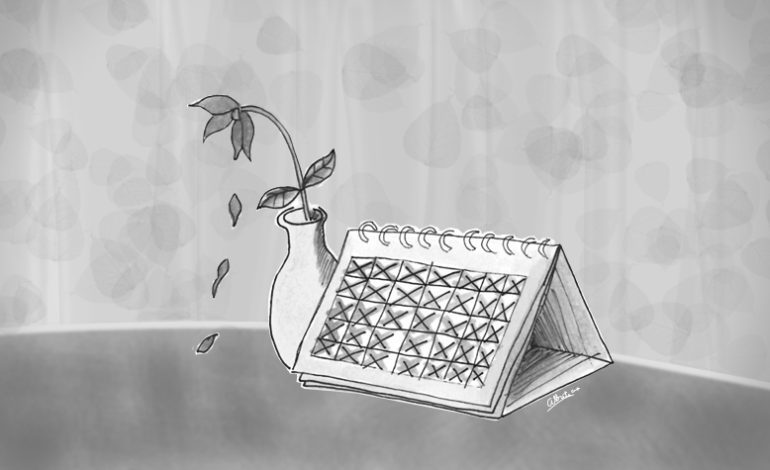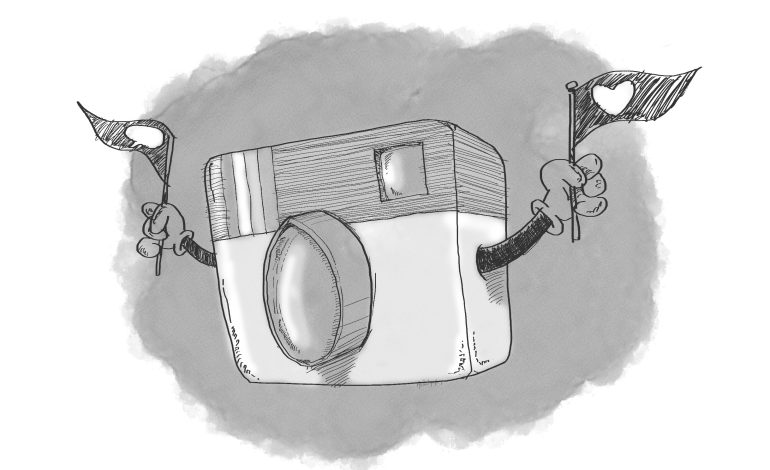The Dreaded M-Word (Warning: TMI)

I recovered my womanhood in the bathroom at 4 a.m. one morning. It was during my usual dawn bathroom trip when I discovered that (yes!) I was menstruating again.
In case you wonder, I’m neither a 19-year old college girl worrying about the repercussion of a reckless one-night stand, nor a mother of three suffering from the anxiety of another unplanned pregnancy.
I am a 41 year-old woman, married and happily childless, healthy and fit (I exercise five to six days a week), who had not had her period for two months. Two months, you say, big deal. But, let me tell you, when your menstrual cycle has been as regular and expected as your monthly phone bill (24-26 days), this is not something to take lightly.
Two months were enough to send me over the edge, enough to visualize a life in which I am no longer a part of a human race capable of reproductive activity: a menopausal woman.
It began one afternoon, when I was checking my monthly cycle calendar on my smart phone app and realized that I had not had my period for 32 days. Frantically I bought two pregnancy test packs, and this process itself led to a whole other issue.
You see, for many years my husband and I were never interested in having children, but last year we both kind of agreed to stop our traditional birth control method (don’t ask) to see what would happen. I’m all for organic lifestyle and wasn’t going to subject myself to a bunch of tests and hormone therapies, and he wasn’t about to masturbate into a test tube. So if we’re considering having an offspring, we decided to do it the way human animals are supposed to do, and that is having unprotected sex.
When nothing happened, I was actually kind of relieved, for I’m really attached to our wonderful childless lifestyle. So when the period stopped two months ago, I had mixed feelings about it—on the one hand thinking maybe this is when I finally settle down and have kids, on the other hand praying, “Dear God, please don’t make me pregnant; I’m not ready.”
But the test pack says No Preggo. And 39 days passed without any sign of the monthly visitor. Another test, the same negative. Then 47 days—still nothing.
At this point, a sense of desperation and real fear started to sink in. What if I never menstruate again? This automatically amplified my vanity. I invested in pricey anti-aging moisturizers in fear that my skin would dry up and shrivel up soon. I checked under my chin everyday for a previously unspotted extra layer.
And the paranoia: every time it got hotter than usual (I live in tropical Jakarta, where the mean temperature is 31 degrees Celsius), I wondered whether I was experiencing a hot flash. I would blame my occasional crankiness on an imaginary hormonal problem (crankiness that, looking back now, was really self-perpetuated by the worries).
Of course I was aware that many women continue to be beautiful, fit and accomplished after menopause, but I was taken over by some irrational fear. I tell you, not menstruating could really erode your sense of female identity.
A few years ago, a friend I met through yoga told me she hadn’t had her period in over a year, and no medical doctors and alternative therapists were able to find the cause and cure for her. In her late 20s and had been married for a few years then, this girl always looked slightly downcast (emotionally constipated is how I would describe it), despite living a very cushy life with a doting husband. Back then, my insensitive self remarked to her on how nice it must be not to have the monthly fuss. It was eventually discovered that her problems were psychological. And a month after it was resolved, she got pregnant.
But, I was not depressed. Psychologically I’m in the best place in my life. Plus, I drink green smoothies in the morning and eat a mostly plant-based diet.
“Have sex more,” suggested one friend. “Sometimes it’s like a ketchup bottle, you have to shake it to get it out.”
Thanks, I don’t think I’ll look at a ketchup bottle the same way again.
On Day-50 I saw a gynecologist. After some tests, he told me there were no signs of endometriosis or fibroid. Yes, my reproductive system might be getting a bit mature (to say the least), but other than that, I was perfectly fine.
“It’s actually normal to skip one or two months of period in one year; most often it’s caused by stress or fatigue,” he said. “It’s when you get your period too often and too much that you should start to worry.”
“Come back and see me in three months, if you still haven’t got your period, then we’ll do more checks.”
I looked it up: A woman is considered to have secondary amenorrhea, which is the absence of periods in a previously menstruating woman (as opposed to primary amenorrhea, which occurs when a woman never menstruates), when she has missed three menstrual periods in a row. Possible causes are excessive weight gain or loss, eating disorders, strenuous exercise and hormonal problems, none of which could be linked to me.
The visit to the doctor put me in perspective. I decided it must be my ambitious ongoing book project that was doing all the havoc to my system. But it also got me wonder, why is it that we women associate our womanhood with menstruation (even for someone like me, a big believer in women having the ultimate choice to say no to fulfilling their reproductive role)?
In the animal kingdom, human is only one of the few mammals that menstruate, leaving scientists at odds over its evolutionary function. But our culture sees it differently, as a mark of femininity. In Indonesia, a girl who has menstruated is considered to have reached akil-balig, which means she is marriageable, which means she’s ready to grow into a whole woman.
Technically, menopause is only the cessation of the monthly period, occurring commonly between the age of 45 and 55. And yet the word carries negative connotation—the end of an era, a withered old prune with ovaries shut for business—judging by the range of books and articles on how to survive menopause.
During this “mens-less” episode I was guilty of sexism and ageism as the people I often criticized. But I’ve since learned to make peace with the possibility that some day, not too long from now, I will have to retire my Lunette Cup.
When that happens, I will try to look at the bright side: that I finally don’t have to plan my travels and outdoor activities around my period, which is one less hassle to deal with.






















